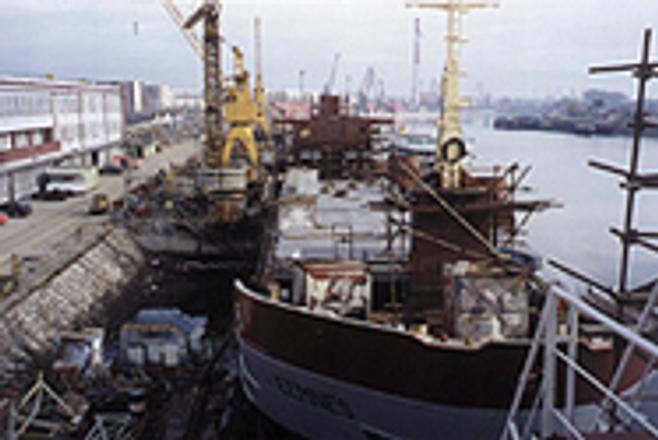The shipyards at Komárno. SLKB has finally got the government loan guarantees its parent company sought for more than a year.photo: Peter Barecz
The Komárno shipyard Slovenské lodenice is about to receive the kiss of life following confirmation that collapsed shipbuilder Slovenské lodenice Komárno (SLK)'s daughter company Slovenské lodenice Komárno Bratislava (SLKB), formed in October last year to consolidate production, will get a 28.7 million Deutsche mark loan from import-export bank Eximbanka guaranteed by the Slovak government.
The loan, which the government had previously refused to guarantee to SLK for fear that the company would default on it, will be used to finish construction of three ships for foreign customers.
The guarantee has widely been seen as a show of support for the yard's consolidation since October, when new management was appointed.
The quality of Slovak management has been recently questioned by human resources experts and surveys from international agencies which showed 30% of Slovak companies were mismanaged. Corporate sector analysts have said that due to this mismanagement it will take Slovak firms about four years to catch up with those in neighbouring Hungary, Poland and the Czech Republic.
Gaining the government guarantees, though, has been identified by some analysts as a positive example of new management bucking this trend.
According to Marek Jakoby of the economic think tank MESA 10: "The new SLK management really helped to stabilise the situation in the shipyard and has openly declared its will to consolidate it. I have a very good impression of this new management and what it has achieved in comparison with the previous one."
SLK ran into financial trouble following the 1999 Kosovo crisis, claiming bombed-out bridges from the NATO strikes against Serbia had prevented it from delivering ships to its customers lower down the Danube river.
It was later revealed that the shipyard had economic problems before the Kosovo conflict which were due to mismanagement. In October 2000, the SLK board was recalled and charges were laid against SLK's former chairman and two other board members for massive tax and insurance fraud.
In December, SLK's new management filed for bankruptcy of the mother company under the revised bankruptcy law which came into effect in August last year. Under the revised law the company is obliged to file if its obligations exceed its assets for more than 60 days, a term which in SLK's case was met shortly before the end of the year.
Government representatives were also full of praise for the firm, saying that the decision to provide the loan guarantee was key for the shipyard's survival and had come after agreement on government consolidation plans for the firm implemented by SLK's new management.
"If members of SLK's management hadn't persuaded the government of their will to consolidate the shipyard it would have been difficult to provide guarantees for the loan," said Silvia Czúczorová, an assistant to the Deputy Finance Minister Vladimil Podstránsky, and a member of SLK's supervisory board.
However, while SLKB's management have gained some praise, analysts remain unwilling to say that the general situation in Slovak management is on the up.
"From this one particular firm we shouldn't draw a general picture of the entire [management] environment," said Jan Toth, analyst at ING Barings.
Karol Balog, director of the Agency for Industrial Development and Revitalisation (AIDR) said the only reason why the government decided to provide a guarantee for SLKB's loan was that SLKB's owner is now the FNM.
"The situation in the shipyard had grown to a point where the government wasn't willing to provide a guarantee to any company with private shareholders. So, in all honesty the new management had nothing to do with it," Balog said.
Balog also said that little had improved in the overall quality of management in the country. "It will definitely be some time longer before this gets much better," he said.
SLK's board chairman Jozef Žucha, remains pleased with his own teams performance in stabilising SLK, regardless of the situation in Slovakia generally.
He said that his management had put a considerable amount of work into the deal. "We have managed to ensure support of SLK's customers, and persuade them to switch contracts from SLK's mother company to SLKB. This is one of the basic conditions necessary for continuation of ship construction," Žucha told The Slovak Spectator January 9.
He added that by gaining the government guarantees SLKB had proven it was a trustworthy company.
When new management took over last year it declared its principle aims for consolidation as clarifying its ownership structure, consolidating assets, and proper regulation of finance flows - something the government had demanded before agreeing to the guarantees.


